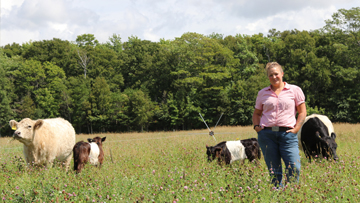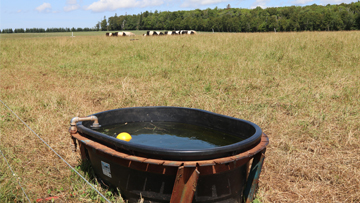Amidst the growing forages, about a dozen cattle and their calves happily graze and leave their mark on the field – natural fertilizer in the form of manure. Sally Bernard of Barnyard Organics in Freetown, Prince Edward Island, has more than 30 cows on the farm that move from field to field helping to improve soil health that can promote crop growth and capture carbon from the atmosphere.
Barnyard Organics began in 2006 when Sally and her husband Mark, a fourth-generation farmer, moved back to Prince Edward Island and transitioned fields from potatoes to certified organic grains by 2010. They now grow 500 acres of organic grains for Maritime livestock producers.
“In organic farming, there’s often a heavy reliance on tillage, which could lead to soil degradation over time. We noticed a few years ago that our fertility, or soil health in general, just didn't seem to be thriving the way that we had hoped it would,” says Sally.
In addition to sustainable practices already in use on the farm, like adding compost to soils and using reduced tillage methods, Sally decided to bring in cattle to see how they would affect soil health. They trialed a few cows fenced into one field in 2019 and were impressed with the results, not just in the improvement of soil health but also in the big boost in grain yield.
Just when Sally was about to purchase additional cattle to graze more acreage in 2021, Agriculture and Agri-Food Canada launched the On-Farm Climate Action Fund (OFCAF), a program that supports farmers in adopting beneficial management practices that store carbon and reduce greenhouse gases, specifically in the areas of nitrogen management, cover cropping, and rotational grazing practices. On Prince Edward Island, OFCAF funding is distributed by the PEI Federation of Agriculture.
The timing for OFCAF, according to Sally, couldn’t have been more perfect.
"We were bringing in more cattle at the same time, and we needed to build the infrastructure to be able to move the cattle intensively, to make the most of their capabilities across the farm,” explains Sally. “I was really thrilled to see the Government of Canada recognize the value that cattle could offer to mitigate climate change.”
Barnyard Organics received OFCAF funding to invest in unique fencing called tumble wheels, which are large spoke-like rollers attached to wire fencing. They can be moved easily by just one person, and it provides a fresh grazing area for cattle within seconds. Sally also received OFCAF funding to expand their reach for cattle grazing with new easy-to-install posts and fencing, as well as waterlines to ensure her cows are staying well hydrated in the fields.
“We've accessed all sorts of government programs, but this one has been one of the best in terms of administration and not taking a ton of my time. OFCAF has been really worth it and folks at the PEI Federation of Agriculture have been amazing to work with,” says Sally.
"We wouldn’t have been able to expand our grazing capabilities so quickly without OFCAF. It means more healthy soils that can capture carbon, better grain yields in more fields, and even unexpected benefits like more biodiversity of birds and insects.”
Learn how to apply to the On-Farm Climate Action Fund.

With funding from OFCAF, Sally Bernard purchased tumble wheel fencing seen here in the background that can be moved easily and efficiently.

OFCAF funding to Barnyard Organics also allowed them to extend water coverage to ensure cattle stay hydrated.
Get more Agri-info
- Want more stories like this? Explore what else Agri-info has to offer.
- Interested in reporting on this story? Contact AAFC Media Relations at aafc.mediarelations-relationsmedias.aac@agr.gc.ca to arrange an interview with one of our experts.